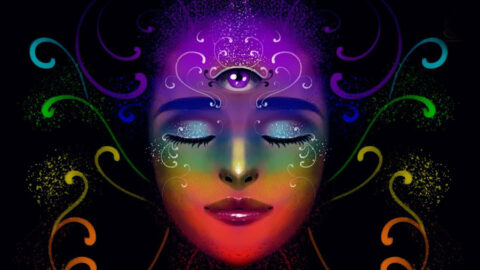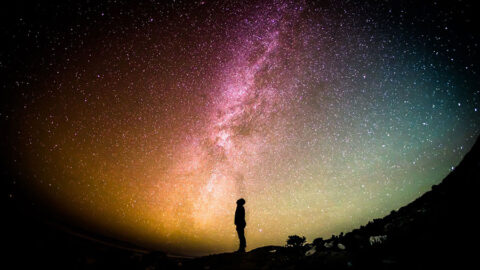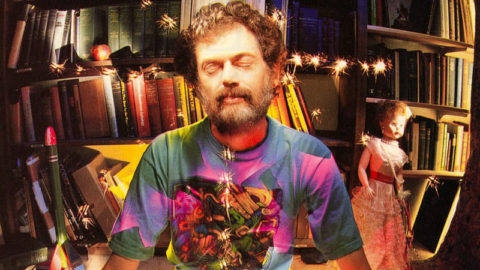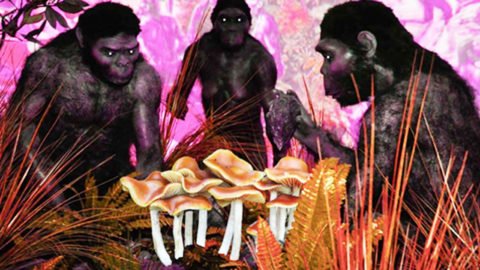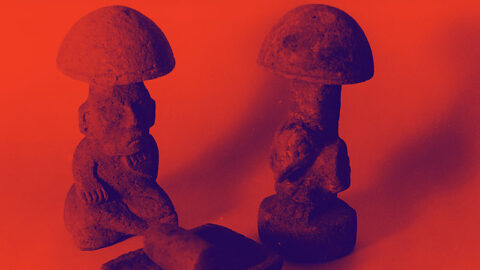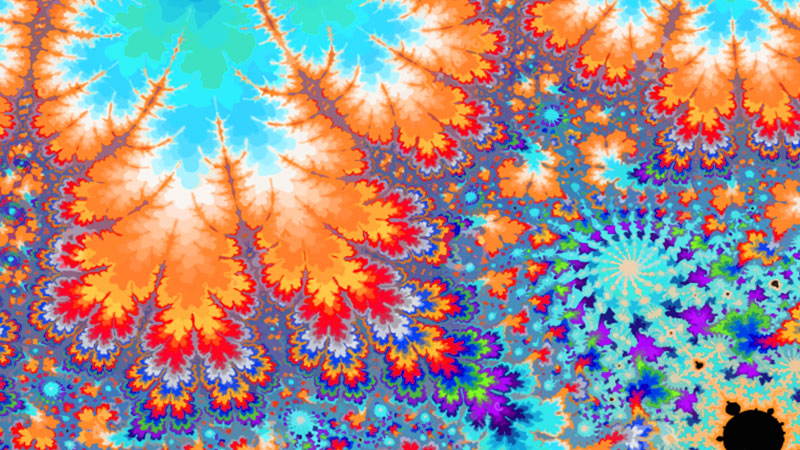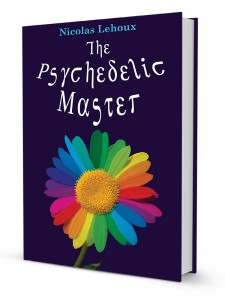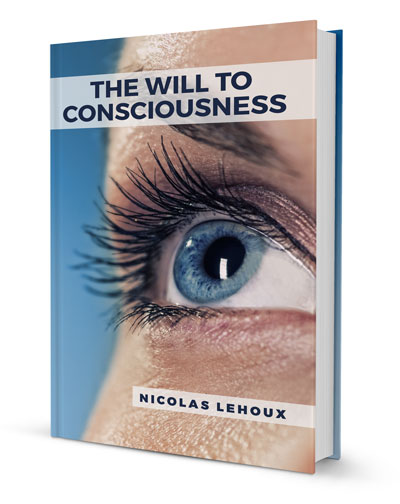Extract from The Psychedelic Master
.
The best Indian gurus are wise tricksters who have mastered the one simple rule of entropy – It’s all going to hell, so get yourself a comfortable spot here and now, and let the fools who are still searching come and project their illusions – and their money – on your calm, cool, blank facade.
– Timothy Leary
We know how the idea of madness, especially the madness of God, can be pejorative. Our contemporaries are as one scared, intrigued and bewildered by it. The madman disturbs and often challenges society’s precarious normality. Already in ancient times, madness was integral to the foundation myths of Hellenism. In his iconic Phaedrus, Plato distinguishes two kinds of madness (mania): that of humans – vulgar madness – and that of the divine – the madness of God. St. Paul attributes to God himself a touch of madness: “For the madness of God is wiser than human wisdom.”
An individual considered a schizophrenic in America is elevated to shaman or deified in many traditional and indigenous cultures. People listen to his advice and learn from him because he has privileged access to non-ordinary reality. Numerous realized masters are content to meditate in motionless silence, cozy with their own ecstasy. But for Western materialists, who consider productivity, busyness, possession and active participation in society to be the pinnacle of human evolution, these teachers only demonstrate symptoms of mental illness (catatonia, hallucinations, etc.).
Madness is therefore a common theme in the field of entheogens. To feel it stir in us is normal during a psychedelic experience. At times there is nothing left to understand and we have the impression we are going crazy: we lose control (which is healthy) as the concept of space-time changes and consensus reality crumbles. We awaken to nonlinearity and the absence of logic, and while the mind, still active, tries to make linear what is fundamentally nonlinear, our consciousness gallops full bore into the incomprehensible chaos of reality. There comes a point, terrifying for some, where the ego is disabled and personality sublimates itself. A schizophrenic state of mind takes hold because what we believed to be solid has dematerialized.
Albert Hofmann had the intuition to send his LSD-25 to psychiatrists, psychologists and therapists immediately after synthesizing it. He was convinced that LSD would allow mental health professionals to finally have personal access to the madness experienced by their patients. In a therapeutic context, psychedelics are highly effective in making manifest and resolving subconscious and superconscious complexes. For a healthy and balanced individual there is little danger, but for those with mental illness and psychological disorders (diagnosed or latent) consequences can be devastating. Without the assistance of a professional to integrate the experience in everyday life, emotional and motor problems can lead a person to believe (or determine) that he or she is crazy.
People with a predisposition for mental illness usually start demonstrating symptoms in childhood and the psychedelic experience (like any form of extreme shock) can trigger a latent psychosis if the individual is not accompanied by a professional of the psyche to help interpret it. Had he not ingested a substance, his madness would probably be received with more patience and indulgence, but the fact that he used a drug can make his entourage hysterical. It becomes easy then for his family to blame drugs or the bad influence of his friends instead of admitting that everything was already potentially there. In crisis, taken off guard, unable to explain what is really happening to him, the individual is confronted with materialistic psychiatrists and a hysterical family. The probability of aggravating the situation is rather high. Psychedelics do not create madness, however, though they may stimulate a premature activation of a psychosis or a spiritual emergence. By consciously seeking to understand himself, the individual may forestall the inevitable moment of the crisis.
The differences between psychosis and spiritual emergence, and between mental illness and holiness are subtle. Spiritual emergency refers to the psychic transition from an egocentric perception of the universe to one that is global, sometimes called holistic or transpersonal. This transition from one mode to another can be sudden and accompanied by intense experiences that disrupt the daily life of the person and his entourage. Often diagnosed as psychosis by rational people and the medical establishment, spiritual emergence is quite normal and healthy as long as the process – usually lasting forty days – is allowed to proceed without being blocked by misunderstanding or drugs. Those who use psychedelics should be aware of this phenomenon (also known as the awakening of kundalini). For some the process is so violent and destabilizing that social life becomes distressing. This can result in work stoppage and an isolation which can be beneficial to the unfolding of the process. It is no coincidence, for example, that Jesus spent forty days in the desert during his spiritual emergency. I have met people who had such experiences, but those who did not know to surround themselves with understanding and openness ended up in the psych ward. Today they are traumatized and fearful as a result of the treatment they suffered during their crisis and afterward. They feel betrayed, misunderstood and scorned, because when they most needed gentleness and openness they were judged, ostracized and ignored, and in the most extreme cases given analgesics and involuntarily committed.
Never forget, however, that one man’s meat is another man’s poison. It is better to let others follow their own process and not appropriate the authority to intervene unnecessarily, unless the individual affected by mental and psychic disorders asks us specifically or his presence disrupts our own lives.
The only difference between me and a madman is that I’m not crazy.
– Salvador Dali
Riding the space shuttle into our inner cosmos is the easy part – we must still return to earth sound of mind. Those who do not concern themselves with the landing may find the return very painful. Some believe that the experience in itself is sufficient, not understanding its deeper meaning, and they become more and more detached. Freedom and the high psychic velocity provided by psychedelics are so intoxicating that it is easy to feel trapped by the constraints of the physical world and the rules governing society when we reintegrate our daily lives. Some will find satisfaction and mystical union replaced by discomfort and separation.
The effects of psychedelics last much longer than the typical six to eight hours. It is beneficial to learn to work with the residual effects harmoniously, because each experience triggers a program or metaprogram which sometimes takes longer to unfold completely. Several short-term experiments are sometimes necessary to change the most complex and deep-rooted programs.
As a result of two MDMA experiments a week apart, I remained hypersensitive to the invisible realms for two weeks. My telepathic communications were so clear that I felt the flames of madness lick at me. Indeed, when inner reality becomes more alive and real than external reality, we have this strange feeling of being crosswise with everything – to have access to a miraculous way of life without being able to express it to others, because psychedelics do indeed open the doors of perception… and they do not close completely afterward. For some they remain wide open. The experience switches on the psyche, activates it, makes it crazy, supercharges it, and that brute force can sometimes destabilize the delicate balance of the psyche. But meditation helps me regain my mental balance, internalize the teachings, observe myself, and note the quantum changes that occur in me.
I went so far in my vast luminous spaces that I almost lost my footing. I gradually started to isolate myself from my peers whom I found not to be like me at all. I dedicated myself to my art without compromise, and stayed on the path making sure that every step was deliberate. The closer I came to Being, the further I grew from humans. I was born under a lucky star, however, and every time madness threatened to engulf me, an invisible hand set me back on track. I would then remember that I am an artist and my pleasure is to convey the beauty in which I sometimes get lost.
I deactivated my emotions to focus on feelings. Emotions gobble up time and are the root cause of suffering, while feelings are rooted in the here and now. The mind is a perfect metaprogramme, steady, unwilling to be swayed by the superficiality of emotions. The sage knows this, and that is why he focuses on the calm depths of his oceanic being. My equanimity often plays tricks on me when I’m with unenlightened humans. They make jokes and I laugh inwardly, but the message does not reach my face. I am thought to be serious, when in fact I am happy and elated. I See the world in its entirety. I am told I am detached and insensitive, but that is because my sensitivity is unintelligible to most. I work in the invisible, the subtle. When I confide in people that I am telepathic and clairvoyant, I am looked at sometimes with condescension and sometimes with terror. This condescension is painful because I’m not sick, by God! I am of sound mind and in good health! But try explaining that to someone whose balance is chained to reason and has never had transpersonal experiences – that is to say, most humans on this planet. When reality is dematerialized around me, when everything is white light and energy, then I know I am harmonious, and that one day this will be the norm. Social conventions are impermanent; I disabled them to remain intentionally conscious in this game of perspectives on the threshold of the Absolute.
This provocative delusion of which I am accused will be evidence of health in the future, because the voluntarily conscious individual will have to know how to laugh at himself and manifest his folly.
– André Moreau
While writing my book The Absolute Happiness I found myself so alone that I felt madness taking me over. My perceptions became clear, my reality transparent…. I lived in the invisible most of the time. Loneliness dislocates the mind more assuredly than anything; days are long and silence fills everything. I knew I would not speak to anyone for days at a time and that those few moments of interaction would only be superficial conversation, anyway. I wondered how I got there, because it is painful to feel forgotten… even if, in fact, it was I who had forgotten my own humanity to create Myself once and for all. As Odysseus said, “Immortality is when you forget men, and men forget you.” Paradox had it that during the most intense loneliness I bathed in a happiness so profound I still struggle to express it, and I had the good sense to write a book about it at the time. And that is precisely why I will resist time… and madness. I have a vocation and that is what keeps me healthy and alive despite all the hardships. Art and writing remain the best way for me to maintain a grip on my sanity.
At that time alien entities began communicating with me. I split in two under the pressure; one side myself, lucid, almost disjointed but still able to write, draw and paint; and the other side my supra-consciousness that took the form of aliens looking for a teacher on Being. Through a fantastic acrobatic choreography I allowed my Self to teach myself knowledge that no human could have taught me. Carl G. Jung had many such archetypal conversations. We can speak telepathically to these beings and receive precise answers, sometimes from outside our field of normal comprehension. I talk to myself, and I let myself play the game with the clear feeling that I am an omnipotent god. In this type of communication I speak and I note everything in my notebooks so as not to forget.
Psychedelics disable the critical and rational aspects of the mind, helping us experience reality without trying to control and understand everything. By letting yourself be while remaining aware, you invite intense feelings of madness. At this point, all you need is trust and to let the experience grow without fear. To be crazy for a few hours is beneficial. It puts everything in perspective. During those times, I create dizzying interrelationships between several ideas, I discover constellations and connect concepts to create others, ever more brilliant and unexpected. But always in the back of my mind is the understanding that I caused this state by imbibing, a few hours earlier, a psychedelic. So I relax, I enjoy the experience and let myself be, all the while being aware that the effects will necessarily soon disappear and that this state will no longer be so easily accessible.
.
Extract from The Psychedelic Master



